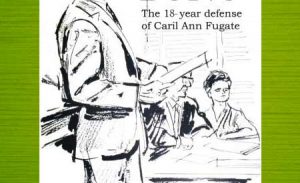Nin’s making ham-hock soup, feeding her
hypomania: A.M. radio talking-heads
rail for holiness on and on for keeping
“Christ” in Christmas, the needles, I’m sure
screaming eagles in the VU-Meters at consoles
saluting Limbaugh − Rush, Rush, Rush! It’s a
32-degree morn − waiting for the snow, a southeast
spurge mixed with a northeast plunge; the JD 155
on the charge-drive yesterday, Jerry Lee Lewis
singing “There Stands the Glass,” Cricket at my feet
here in my Study, twenty feet from Derek’s Awning.
I’m concerned that the names herein don’t have enough
meat on them to flesh the surfaces and spread tension for
you, Dear Reader, if some form of Country’s not your
bag: I didn’t make a fire Christmas eve or Christmas
morning, since Jacob’s like Nin’s dad − hot-natured, spinning
here and yon in shorts, while well-diggers search for
work, not wanting to fricassee their asses like the boy does
his in Fred Chappell’s “Cleaning the Well”: well, I’ll tell
you, I’ll throw a horseshoe over my left shoulder any day for
Roni Stoneman’s good life and for her “pressing on,” the
title of her memoir as told to Ellen Wright: Stoneman
got the message early on Hee-Haw, she says, to tone
down her three-finger banjo-picking so “bigger stars” might
gather, though they brighten back roads, beltways, inner
cities, cornfields, and most of England: I read in
Country Music Magazine, May, 2011 issue, that
Roni Stoneman recently married an Englishman, her seventh
time around the vows: the Stoneman Family’s a
dynasty, starting in a log cabin in Carroll County, Virginia:
Pop toured in the 20’s and 30’s, he and his wife
raising at least thirteen children out of a few over
twenty: if Roni Stoneman were Roy Clark she’d have a
theatre at Branson! Stringbean was known as “The Kentucky
Wonder”: Mama used to plant Kentucky Wonders in her
garden: String’s a runner off Uncle Dave Macon’s
shoot, toured with early country musicians, Macon,
Foley, Monroe, Tubb, Childre: Macon willed String
one of his banjoes: Roni Stoneman wore garb to grab the
public’s salute, including curlers in her hair; she kept her
ironing board like a body-part-tack-on beside her on the
TV-screen: her Hee-Haw persona was Ida Lee Nagger, a
man-crazy flirt. String dressed in combo shirt-pants and a
fake belt buckled way down below his knees: born
David Akeman, Annville, Kentucky, he would play and
grin, “I feel so unnecessary,” singing “20-Cent Cotton and
90 Cent Meat” or my favorite, “Rattler”: String and his
wife, Estelle, were murdered in 1973, crooks looking for his
money later found in the chimney, dusty and done-for, mice
having gnawed tens of thousands of dollars David Akeman would
never bank. Thank A. R. Ammons for The Snow Poems: outside
my window-study’s a splendored wonderment, flakes falling far
as I can see and fields of cotton smiling back at me: in my
poses I heap up snow so you can hear me calling from
Sanders Road, no more a little road than the big pickup-trucks
which seem to be the vehicular preference this 26 Dec 2010: Nin’s
still using her Walker: I hope she will get stronger legs and put the
Helper away: she’s still hypo: I hear Jerry Byrd, the Man of Steel, play
“Over the Waves,” as Cricket half-sneezes and
sniffles for the dregs in my coffee cup: I’m looking
for some S’s, wanting to use “still” as many times as
it comes to mind: I want to keep today’s entry as prosy
as possible, since the poem’s outside my window in the
snow falling without fail the same color as the underside
of Derek’s Awning ribbing in shadows droplets frozen to
the metal-white beams, flecks flurrying under the
canopy like ashes white from Bell’s Three Nuns − “None
Nicer” − curling in ropes from my father’s pipe, Cricket
performing a motion approximating twirl on the oriental
rug in my study: I knew she needed to do number 2: I
would if I were a dog: the snow’s too deep for her to
do more than number 1: why we sank up in drifts this
morning: she won’t talk, since she’s a dog: signs get
us through the snow-showering S’s: I picked her up, all
ten pounds, took her to the left of the back stoop
(poots) where the brittle leaves tickled her tummy and
made her uncomfortably stationary; still she whirled around
two or three times as if she wanted to catch her tail, then
squatted and let out a dark brown pipe of song
twanging with smoke in the snow; the whole thing
was majesty supreme − hot on cold; then she turned and
walked slowly away; up the steps she goose-stepped
until she reached the top: the snow had
already frozen on her legs, her wheaten hair
stiff as the day after Christmas, “Christ” out of the
fray, the flakes settling to the page as if a harmonium
cleansed its bellows like Joe Stuart yelling orders
down the bar he tended at the Spanish Village in
Madison, Wisconsin, about 1970, trying
to make a living to supplement his memory of
performing as a Bluegrass Boy with Bill Monroe: consider
J. D. Sumner, too, the deep bass singer, and
Marion Sumner, fiddle-king of the South: Marion just
walked up with his fiddle at a jam I helped make at
Hindman Settlement School, late 80’s: I bought the cassette-tape
he and Jesse cut: Marion Sumner with Jesse McReynolds:
Fiddle Fantastic. The trees outside my window dedicate
themselves to not being felled, gathering chords in
fluffs, goo, like bird-do on lime-twigs white on a
bowing white morning, the licking-skillet scoring
Gid Tanner’s “Down Yonder” and Riley Puckett’s
lead on “The Wreck of the Old 97”: Jimmie Tarleton
wrote “Columbus Stockade Blues”: maybe
Tom Darby wrote it too: perhaps they both did.
Who knows! Tarleton probably penned “Birmingham Jail”:
Tom Darby and Jimmie Tarleton called themselves
Tarleton and Darby. T & D! They recorded Tarleton’s
“jail” song and “Columbus Stockade Blues”: there is a
lot we just cannot know for sure, Who’s on first or
second, for one: if the Tenneva Ramblers had
stayed on the good side of Jimmie C. Rodgers they
might not have seen Jimmie shimmer to the door into the
“other” state and leave them behind to ever be
forgotten except by collectors and protectors of
folk and country: Sonny Terry tore into the sun where
he tarried, his mouth harp concerting with Lead Belly and
Brownie McGhee, songs they would lose in harmonies
supporting “Kansas City,” “Custard Pie,” “Baby, Baby Blues,”
you get the picture, a State of Blues very different
from the Texas Longhorns, with Dewy Groom, the
wheezy western swing, those Gates of Love
sprung wide, the Texas Playboys coming on, Bob Wills
leading the way: let’s not forget Texas Slim either: there
might be many, but only one Slim who called himself at times
John Lee Cooker, Delta John, John Lee, and other
Names − the many − one. John Lee Hooker, the
Clarksdale, Mississippi, dash readily traveled, adapting
Opportunity, soul, big as the states he crossed, hanging his
mouth around his heart like Clarence “Gatemouth” Brown, who
played several instruments − singing country, jazz, Cajun, blues − just
as the Texas troubadours − Eddie Tudor, Butterball Paige, Ernest Tubb,
Jack Greene, Buddy Charleton, Leon Rhodes, Billy Byrd − and
Lord knows how many more − jammed tunes. Bobby Thompson’s
banjo might have smoothed chords with every musician from
Gloria Belle to Tom Morrell: Bobby T played his five-string
some with the Virginia Boys − Jim and Jesse McReynolds; he
stood up in Cornfield County on Hee-Haw and shouted
S-a-l-u-t-e! Hank Thompson! His Brazos boys’ balls were
not brass, though the author of a book on Hank T
lifts stud’s-man-slip to Puerile Dock, while the boys
wave their bandanas to bring the groupies on; why, when
they’d play on party-nights until one or two or three, it
seemed the girls could hear the turning of the keys; the
shows, ended¸ the boys would change their instruments for
the sheets: I bet the book-sales flopped like you know
what, because the sex-mix turned no trick other than
more hype and type the biographer trumped − numbers, dresses,
drawers − the way I pull the ratchet-ties over the Scag to hold it
locked on the Leonard Trailer: Hank? “We’ve Gone Too Far,”
“Whoa Sailor, “Green Light,” “Waiting in the Lobby of Your Heart,”
“Yesterday’s Girl,” “Rub-A-Dub-Dub,” “No Help Wanted,”
“Breaking the Rules,” “Honky Tonk Girl,” “A Six Pack to Go”; yet
that Brazos Valley Boys band’s the Thing, practically
post-Wills, such a big, brassy western swing.




Leave a Reply